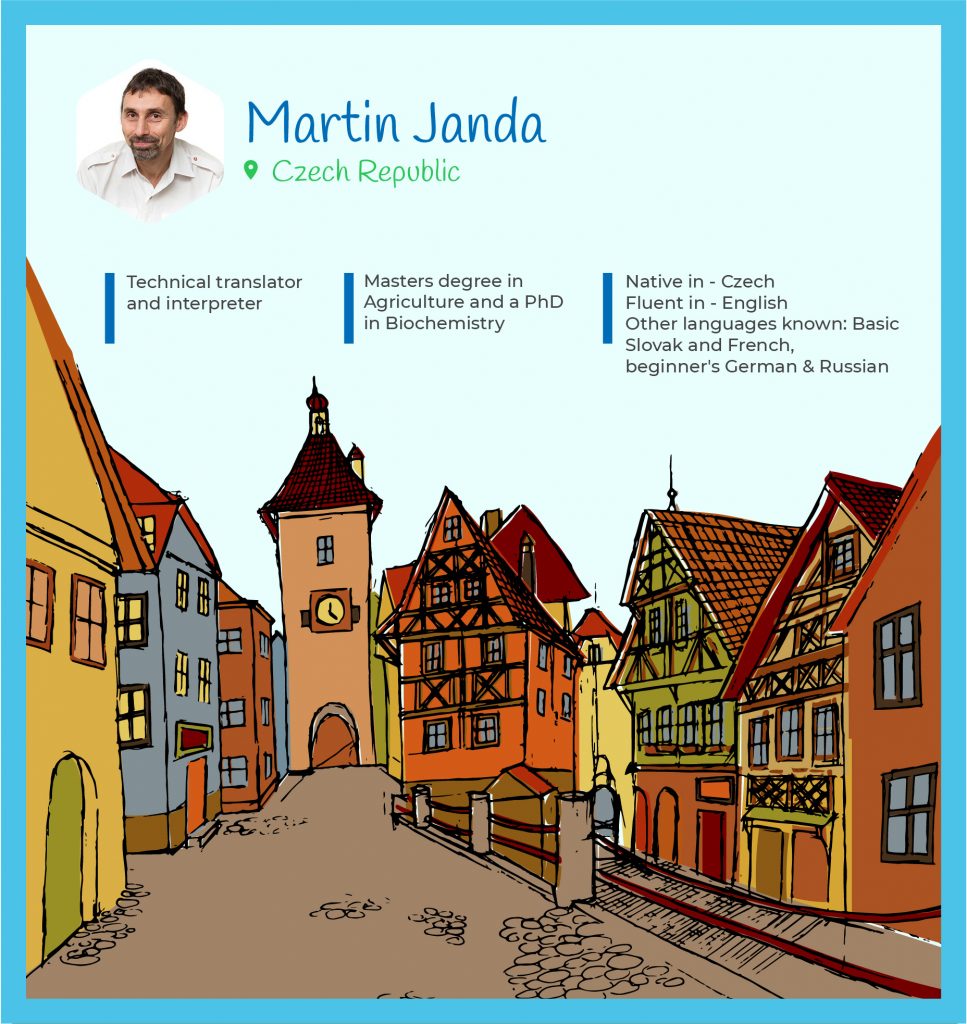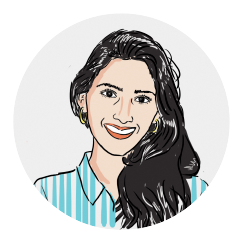Do you know of someone who’s combined their love for science fiction and their native language? Well we do – meet Martin Janda whose work experience boasts of 25 years of interpreting and translating from Czech to English for several industries. Martin’s native language is Czech and he is fluent in English.
If you are interested to know how Martin read English science fiction in communist Czechoslovakia and about that time when he interpreted for Arnold Schwarzenegger, keep reading.


2:Please tell us about your educational background and work experience.
Martin Janda:
I hold a Masters degree in Agriculture and a Ph.D. in Biochemistry. After completing my education, I spent three years as a research biochemist at a laboratory. After that, it’s been only translation and interpreting.
3:What would you have done differently at the start of your career if you knew then, what you know now?
Martin Janda:
I might have tried to go into technical translation and interpreting earlier, but I’m not so sure if it would have been possible at that time.
4:How has being multilingual helped you? Is there one language you prefer thinking in over another language?

Whenever I go on a vacation, I make it a point to order a glass of wine in the local language.
As for the language I prefer thinking in, I have no idea
5:What’s the best advice you’ve ever received?
Martin Janda:
No idea. However, I am a stubborn guy – I need to find the solutions to my problems on my own most of the time.
6:Who is your most significant influence?
Martin Janda:
My wife?
TBH
That’s wonderful.
7:What does a typical day in your life look like?
Martin Janda:
Earlier it used to be typing, typing, and typing. Now, it is dictating, re-dictating, and correcting dictation typos. Other than that, you can find me attending conferences.
8:What has been your biggest challenge, and how did you overcome it?
Martin Janda:
So far, the biggest challenge has been to do my accounting 
9:What has been the most interesting project you’ve ever worked on?

Martin Janda:
I’ve also interpreted for a spiritual guru (Tony Robbins), the you-know-who Arnold Schwarzenegger and Samaritan Order members. It’s tough to tell which one I found to be interesting. So, take your pick!
10:As a translator, what surprising lessons have you learned along the way?
Martin Janda:
One lesson – the perception of quality differs for translators, clients, and users. And that the paying client is the one to decide.
11:How do you want to be remembered?
Martin Janda:
As a good friend and an excellent translator.
12:Tell us about a funny translation incident that you’ve come across.
Martin Janda:
There was this time when I was interpreting a conference about air conditioning. A French speaker (who spoke English with a thick accent) kept talking about ‘odeur’. As I understand some French, I translated ‘odeur’ for ‘bad smell’ in English.
TBH
You understand French, too? That’s great. What happened then?
Martin Janda:
Here’s the twist – the last slide of his presentation was titled ‘Hot Air’. The entire time he was saying ‘hot air’, I thought he was saying ‘odeur’
13:Could you please teach us some new phrases in your language

Martin Janda:
Sure, let me teach you how to order a beer in Czech.
TBH
Thank you! Now, we know how to order a beer in Czech.
14:What advice would you give to an aspiring translator?
Martin Janda:
Never settle for a low price forever – you can start with that but then ramp it up over time.
15:Have you noticed any differences in the translation industry from when you began translating?

Martin Janda:
It was challenging to type with mechanical typewriters and dictionaries. For researching, I went to the national library to check out some books. There were no other resources at the time and not many people to check my translations.
TBH
That is true. However, things have changed a lot after the internet entered the picture.
Martin Janda:
Yes, indeed. Today, many people understand the importance of translation and hence, are competing with each other. Also, finding information and research has become much easier with the advent of the internet.
16:Tell us something about Prague.
Martin Janda:
Prague is all about high mountains, charming towns, and winding roads. It’s not much different from Germany, but as the war hasn’t destroyed the cities and towns here, the place still holds its original charm.
TBH
That’s interesting. We’ve also heard that the architecture in Prague is unique.
Martin Janda:
Yes, it is. You’ll see a stark difference in the way the houses are built here.
17:Do you pursue any hobbies or interests in your leisure time?
Martin Janda:
I like biking and playing the guitar (I am a terrible player, though). Every now and then, I take time out to enjoy meals from other countries – French, Italian, Indian, etc. Next dish on my list is Central African pastrami – you cannot find that in Prague.
18:Does it help if you form expertise in a field and then translate material related to it? Or is it easier the other way round?

Martin Janda:
I can say this for translation in the medical field – If you want to do a good translation, you must have some experience in the area. It’s challenging to learn afterward, while translating.
I’ll give you an example. My fellow interpreter and I were attending a conference. As he didn’t have much knowledge of medicine, he kept referring to a drug penicillin hydrochloride as ‘hydrochloride’. Now, ‘hydrochloride’ is a chemical salt while ‘penicillin hydrochloride’ is a medicine – as you see the context changes completely.
TBH
That is so true, Martin. Thank you so much for talking to us and sharing interesting stories about your life and career.
Martin Janda:
No problem at all! It was great talking to you guys, too
Hello and thanks for attending this interview! We'd love to know how you got into translation.

You’re welcome 
I was raised in communist Czechoslovakia. I remember going to the national library (which was watched by cameras and police officers, then) every time I wanted to read English books.
That’s some dedication!
One day, my sister-in-law’s friend, who runs a publishing house start-up, needed someone to translate a science fiction book. I translated the book for her, and I enjoyed it. Also, I realized that a couple of hours typing every night paid more than a full-time job at a laboratory. Post this experience, I started taking up projects for technical translation, conference interpretation, etc. Today, I’ve been doing this for 25 years now.
Please tell us about your educational background and work experience.
I hold a Masters degree in Agriculture and a Ph.D. in Biochemistry. After completing my education, I spent three years as a research biochemist at a laboratory. After that, it’s been only translation and interpreting.
What would you have done differently at the start of your career if you knew then, what you know now?
I might have tried to go into technical translation and interpreting earlier, but I’m not so sure if it would have been possible at that time.

